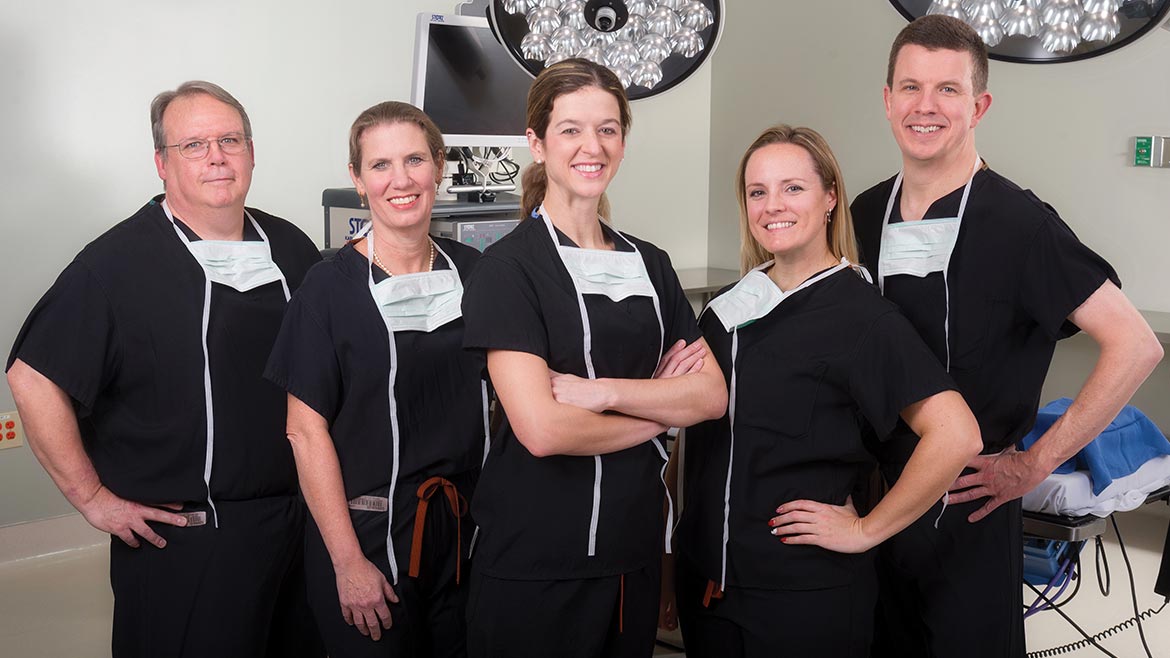Columbia Surgical Associates: Surgically Removed
- photo by LG Patterson

Receiving a diagnosis that requires surgery is traumatic enough for most people. Interruptions or cancellations of a scheduled surgery or consultation only enhances a patient’s anxiety with added frustration. One local surgical group — Columbia Surgical Associates — has removed what they believe to be a significant obstruction to top-notch, quality care.
In December of 2016, the general surgeons of CSA decided to transition to an expanded elective model of surgical care, a hybrid approach combining elective and acute surgeries. CSA surgeons now only perform elective, non-emergency surgeries that are planned in advance. Acute, or emergency, surgeries that would have been performed at CSA will be performed in an inpatient hospital setting.
Going forward, CSA general surgery patients will also be able to choose to have their elective surgical care performed at CSA’s nearby outpatient surgical center or at any of the MU Health Care inpatient surgical facilities in Columbia, thanks to an affiliation with the university. The decision on location, made by the patient and surgeon together, is based on a number of individual factors. The new model increases availability for clinic visits and consults while decreasing wait times for elective surgical procedures.
A Modern Model
Columbia Surgical Associates has represented thousands of patients since first opening in 1961 with just one physician, Dr. E.J. “Jack” Schewe Jr. The group now includes more than two dozen board-certified specialists. CSA has treated a variety of health problems, including diseases of the breast, gallbladder, and intestinal tract; benign and malignant tumors; hernias; and weight loss. CSA also houses the Vein Center of Mid-Missouri, which performs vascular procedures, including surgery.
CSA opened an adjoining outpatient surgical center in 2014, allowing their patients to skip a hospital visit if they were having an elective surgery. In 2015, CSA became affiliated with MU Health Care, giving the surgeons the ability to treat patients at any MU surgical facility. The group also values the working relationship they’ve had with the staff at Boone Hospital for several years, where CSA vascular surgeons will retain active privileges.
Traditionally, many surgical groups, including CSA, were made up of two parts: elective surgery and acute surgery. As hospitals make improvements to acute surgery practices, the shift to a hybrid model is a growing trend among private surgical practices across the United States. Many hospitals are now utilizing acute medical care teams — surgeons who specialize in acute care of patients and only work in a hospital setting, usually seeing no other patients outside of the emergency room. General surgeons, with acute surgeries being taken care of elsewhere, are able to better focus on the needs of elective surgery patients. General surgeons, like those at CSA, can then better focus on the non-emergency needs of elective surgery patients.
“We made the decision to move our inpatient surgical cases to the university system in order to improve our availability to see patients in our office, to make sure we can see those patients promptly, and to get their surgeries performed in a timely manner,” says CSA physician Erik Grossmann.
The Upside
The hybrid model reduces the risk of surgeon burnout and enhances the retention and recruitment of high-quality surgeons in varied specialty areas. The model also allows for more flexibility from CSA surgeons, who were previously required to take emergency room on-call hours and treat acute cases for non-existing patients. These interruptions, at times, hindered their ability to provide top-notch service to existing patients. (CSA continues to have a surgeon on call 24/7 for existing patients or referrals.)
MU Health Care has a dedicated team of surgeons to handle traumas, burns, and emergencies, which has allowed CSA to be more available for clinic appointments in their offices on Grindstone Parkway.
“It was simply a matter of finding out where the CSA surgeons could be able to provide the best care to the patients and the best service to referring physicians who rely on CSA to provide surgical care,” Grossmann says.
CSA physicians also believe this transition to elective surgeries will make those services more available to people in and around Boone County, and patients will be less likely to experience delays or cancellations. The group looks forward to continuing to offer patients the option of outpatient surgical care at the CSA clinic or inpatient care at one of the MU Health Care facilities.
The ultimate goal was to create a more sustainable model for surgical care in Columbia that immediately improves access to care for patients. Grossmann says, “We will, of course, always keep ourselves available to take care of emergency problems experienced by our patients.”
Timeline:
1961
Dr. E.J. “Jack” Schewe Jr. opens the practice in a building on Broadway. Initially, he is the only physician.
1980
CSA establishes the first mobile, noninvasive vascular laboratory in mid-Missouri.
1990
The practice announces it will focus on the development of noninvasive surgeries for CSA patients.
2014
CSA opens an adjoining surgical center, allowing their elective surgery patients to skip a hospital stay.
2015
CSA formally affiliates with MU Health Care.
2016
CSA transitions to a hybrid elective care model to allow more flexibility for surgeons and easier scheduling for patients.


